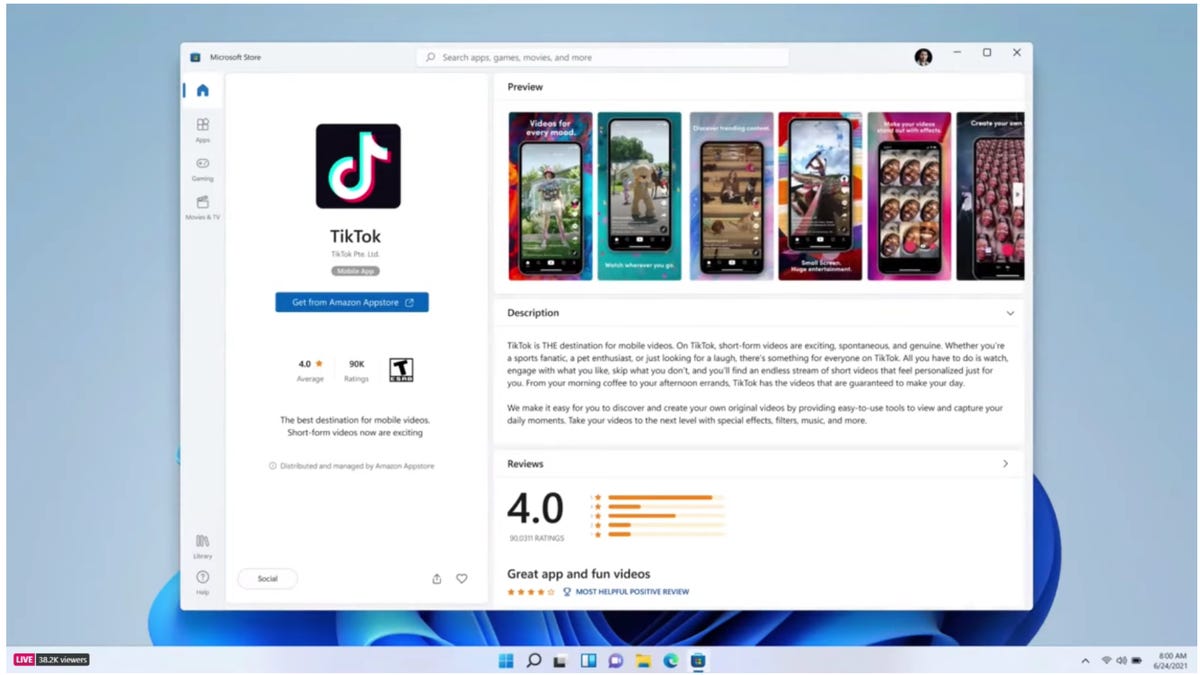Microsoft unveils new Microsoft Store for Windows 11, lets developers keep all the money
The new app store will allow developers to bring any app to the store. They'll also be able to use a third-party commerce engine, and Microsoft's allowing them to keep 100% of the revenue.

Microsoft wants as many developers developing for its Microsoft Store app marketplace as possible. To make that happen, the company announced Thursday that it's revamping its Windows app store to make it more open to all apps and games.
The company is also allowing app developers to use third-party commerce systems for their apps. And if developers "bring their own commerce engine," they get to keep 100% of the revenue, said Panos Panay, chief product officer for Microsoft, during the company's Windows 11 event Thursday. This is a big difference from app stores operated by Apple and Google, which generally take 30% of developer revenue and also require developers to use their specific commerce engines for in-app purchases.
And in another surprise, the new Micorosoft store will also include Android apps that can run within Windows 11. The company has partnered with Amazon to allow the Amazon Appstore to live within the Microsoft store, to give users easy access to these apps from their computers.
Panay called developers "heroes" who "inspire us."
"We just want to make it easier for you to bring [your technology] to the store," he said. "That's our goal. We also want to help you build your business."
The announcement was made during an event introducing Microsoft's Windows 11 update. It's the first major revamp of the PC-powering software in six years. In addition to bringing a more modern smartphone-like look and feel, Microsoft is making upgrades under the hood, in particular to device security and its Windows app store. And of course, it's adding a bunch of features for syncing documents and settings, in an effort to make switching from home to work computers and back much easier as people push for post-pandemic hybrid work options.
The update to the Microsoft store is a big one, because it will pave the way for developers to be able to submit any Windows application to the store, including ones using rival browsers like Chrome or Firefox, and even allow third-party commerce platforms in apps. The news also comes at a time when Congress and regulators are looking more critically at the app store policies of Microsoft's rivals, Apple and Google. Critics say that the companies have too much power over the app marketplaces and that the fees and percentage of revenue the companies keep, stifles competition from app developers. Congress is considering several bills that would update antitrust regulation to rein in the power of these tech giants.
Microsoft's been steadily expanding its Microsoft Store app marketplace since its initial release in 2012. Originally conceived as a place for downloading apps and games, Microsoft's store competes with the wider web, where people can download apps directly to their computers without relying on Microsoft's service. Game companies such as Battlefield war game developer Electronic Arts, Half-Life sci-fi epic maker Valve and Fortnite creator Epic Games offer app stores of their own as well.
But there's good reason for Microsoft to offer an app store. Just like Apple and its iPhone, iPad and Mac app stores, Microsoft regulates its marketplace, requiring developers to submit their programs for review against security and content guidelines. As a result, Microsoft's able to promise more peace of mind to some users who aren't sure where they can safely obtain apps for their computers.



